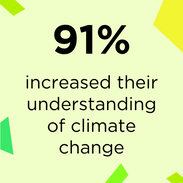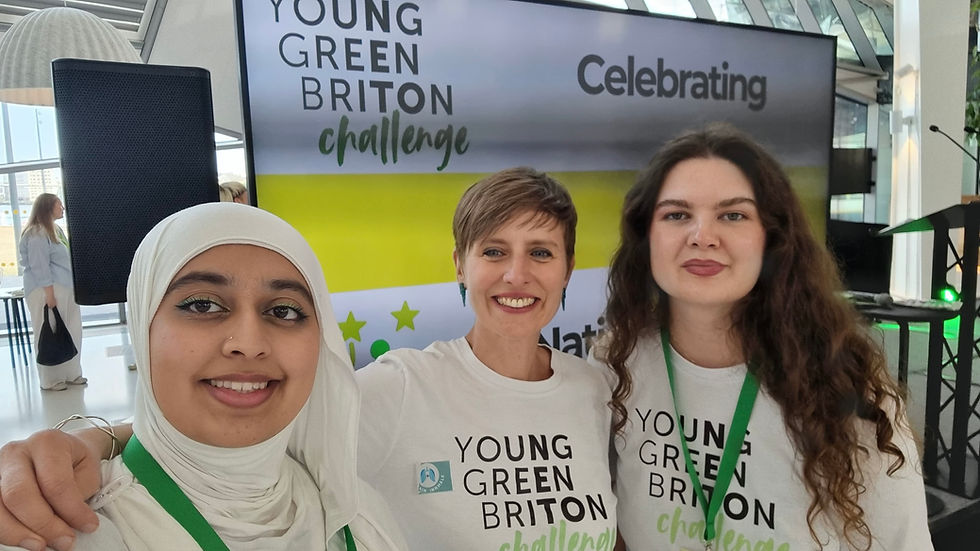Partnering to design the future
- Katherine Crisp

- Mar 12, 2024
- 4 min read
Updated: Apr 29, 2024
Last week the YGBC team (from SI4A, Volunteers for Future and the Ministry of Eco Education) finished the last design workshop for this academic year. We worked with 3,175 students across 18 different schools, integrating our learnings from the first pilot year and continuing to build and develop the model. So now it’s time to share some reflections on what has worked (and where there’s still room for improvement).
Our amazing volunteers!
Last year, we got a lot of feedback from volunteer mentors that they wanted to be involved earlier in the programme. So we invited as many as we could to join us for a design workshop with fantastic results. Our volunteers are an amazingly talented and connected bunch, so it was brilliant to bring their expertise into schools, sharing a little from their own career journeys and providing advice and guidance to young people throughout the workshops.
A huge thank you to everyone who joined us!
L-R: Egger volunteers at Hexham Middle School; a practice dragons den at St Christopher's in Accrington; volunteers from PDS; Elevation and TPX Impact at Cheam High School
Focusing on skills development
YGBC has a component of climate education, but the big focus is on developing skills to
take local action. Towards the end of last year, SI4A participated in the Skills Builder Impact Academy to learn more about the Skills Builder Universal Framework and how we could
explicitly link and embed the Essential skills in YGBC.

In 2024 we achieved Level 3 accreditation for the design workshop, demonstrating the workshop gives students the opportunity to apply the essential skills of Communication, Teamwork, Problem Solving and Creativity.
Flexible options
We know how difficult it is for schools to integrate opportunities that aren’t statutory. The curriculum is packed to bursting point. So we take a really flexible approach that enables schools to tailor YGBC to their cohort of students, their curriculum intent and their timetable. This year we tested a range of different design workshop formats from 2 hours through to a whole day. And whilst most were largely hall based with up to 300 students, we ran some classroom based workshops and some blended across multiple locations. Student, volunteer and facilitator feedback suggests that around 3-4 periods is probably optimum in most schools; starting altogether in a big hall and then breaking out into classrooms. But we will continue to work with schools to maximise the experience for students whilst creatively managing whatever constraints they face.
What have students told us?
We are still crunching the full data and awaiting feedback from some schools, but the initial feedback from students is incredibly positive, given that we are working with whole year groups of students with the design workshop is effectively a mandatory activity.
We aim to build knowledge, skills and hope. We also try to make learning fun and more student-led! The initial feedback from students suggests we aren't doing too bad a job!
Full disclosure - the feedback wasn’t all positive. The narrative feedback highlighted teamwork challenges in every workshop. Some students find it understandably difficult to work in a noisy hall environment. There were tech challenges in some of the schools where we delivered the workshop entirely in classrooms.
So what happens next?
After the design workshops, students have had the opportunity to develop their ideas into embryonic ventures. Schools are now hosting their own dragon’s den style events to give teams the opportunity to pitch for seed investment and mentorship to put their ideas into action. You can read here about the Corbridge Middle School event. Over the coming months we will share the impact that these ventures are having in schools and communities and in early July we will be hosting a celebration event where the most promising ventures will receive further investment.
What might we want to change?
Although we are still deep in delivery for the 2023-24 YGBC programme, we are already planning for 2024-25. Some of the changes we are considering include:
Thematically focusing our materials to link to future green careers, including fashion, circular economy, sustainable sport, green energy, clean tech.
The statutory curriculum leaves limited space for creativity and we really want to increase the opportunity for students to think really creatively in their problem solving. We will be exploring different ways to do this in both our curriculum materials and the design workshops.
Two schools engaged Year 12 students as mentors during the design workshop. This was a great leadership opportunity for these students, as well as being a really valuable contribution to the Year 7 teams who were participating in the workshop. We also really enjoyed seeing teams from last year’s Challenge return to share their experience and tips with younger students. Next year, we want to more explicitly work with schools to build the opportunities for older students to take leadership roles in supporting and mentoring younger students.
Interested in working with us?
This year YGBC is led by Social Innovation for All and Volunteers for Future with key partners being the Ministry of Eco Education and the Green Britain Foundation, along with support from Aveas Consulting, Northumberland County Council and Avanti's Feel Good Field Trips, as well as our amazing volunteers.
As we start to plan for next academic year, we are looking to work with a select number of partners who are excited about the potential to co-create impact at scale. We are looking for partners linked to thematic focus areas including fashion, circular economy, sustainable sport and clean tech. We are also looking to work with regional partners.
Get in touch with kat@si4a.net or laura@volunteersforfuture.org to discuss how we could collaborate.




















Comments